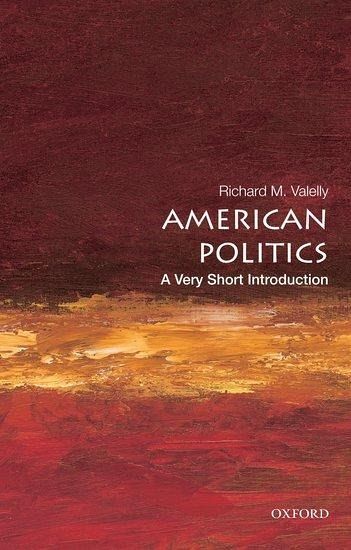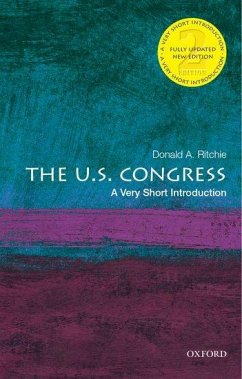
American Politics
A Very Short Introduction

PAYBACK Punkte
8 °P sammeln!
This concise volume fills a long-standing need for a sophisticated, brief primer on American national politics. A major theme of the book is the interplay between constitutional and extra-constitutional institutions and political processes. It provides engaging and exceptionally instructive treatments of the nuts-and-bolts of how American politics works and of the strengths of American democracy, while candidly considering gaps in representation and the issue of
increasing income inequality.
increasing income inequality.
This book introduces the vital elements of American politics, emphasizing how these elements have evolved into the form they take today. By using a historical-institutional approach to the various parts of American politics, Valelly communicates that the American political system is, and always has been, a work in progress-one unfolding within, and also constantly updating, an eighteenth-century constitutional framework. Valelly begins by asking what Americans want
from their politics and answers with a four-part analysis: (1) the politics of "peace and prosperity," (2) the sometimes illiberal politics of conformity and Americanization, (3) the politics of large-scale problem-solving (e.g., the abolition of slavery) and "perfection of the Union," and (4) the
deep public desire for constitutional continuity. The last item provides the organizational framework/theme for the rest of the book. Additional chapters treat parties and polarization (stressing that contemporary polarization reinforces constitutional persistence because it provides for a mix of policy immobility and power-sharing between parties that bitterly disagree); a survey of the basic institutions: the Presidency, Congress, the judicial branch, the unelected bureaucracy of the
independent agencies, and state and local governments. A third group of chapters deals with political communication, public opinion, voting and the boundaries of the electorate, and the politics of government steering of the economy. Finally, Valelly considers the puzzle of the persistence for more than two
centuries of the basic constitutional forms established in 1787. The author employs a mix of quantitative data and historical examples to illustrate the main themes.
ABOUT THE SERIES: The Very Short Introductions series from Oxford University Press contains hundreds of titles in almost every subject area. These pocket-sized books are the perfect way to get ahead in a new subject quickly. Our expert authors combine facts, analysis, perspective, new ideas, and enthusiasm to make interesting and challenging topics highly readable.
from their politics and answers with a four-part analysis: (1) the politics of "peace and prosperity," (2) the sometimes illiberal politics of conformity and Americanization, (3) the politics of large-scale problem-solving (e.g., the abolition of slavery) and "perfection of the Union," and (4) the
deep public desire for constitutional continuity. The last item provides the organizational framework/theme for the rest of the book. Additional chapters treat parties and polarization (stressing that contemporary polarization reinforces constitutional persistence because it provides for a mix of policy immobility and power-sharing between parties that bitterly disagree); a survey of the basic institutions: the Presidency, Congress, the judicial branch, the unelected bureaucracy of the
independent agencies, and state and local governments. A third group of chapters deals with political communication, public opinion, voting and the boundaries of the electorate, and the politics of government steering of the economy. Finally, Valelly considers the puzzle of the persistence for more than two
centuries of the basic constitutional forms established in 1787. The author employs a mix of quantitative data and historical examples to illustrate the main themes.
ABOUT THE SERIES: The Very Short Introductions series from Oxford University Press contains hundreds of titles in almost every subject area. These pocket-sized books are the perfect way to get ahead in a new subject quickly. Our expert authors combine facts, analysis, perspective, new ideas, and enthusiasm to make interesting and challenging topics highly readable.














